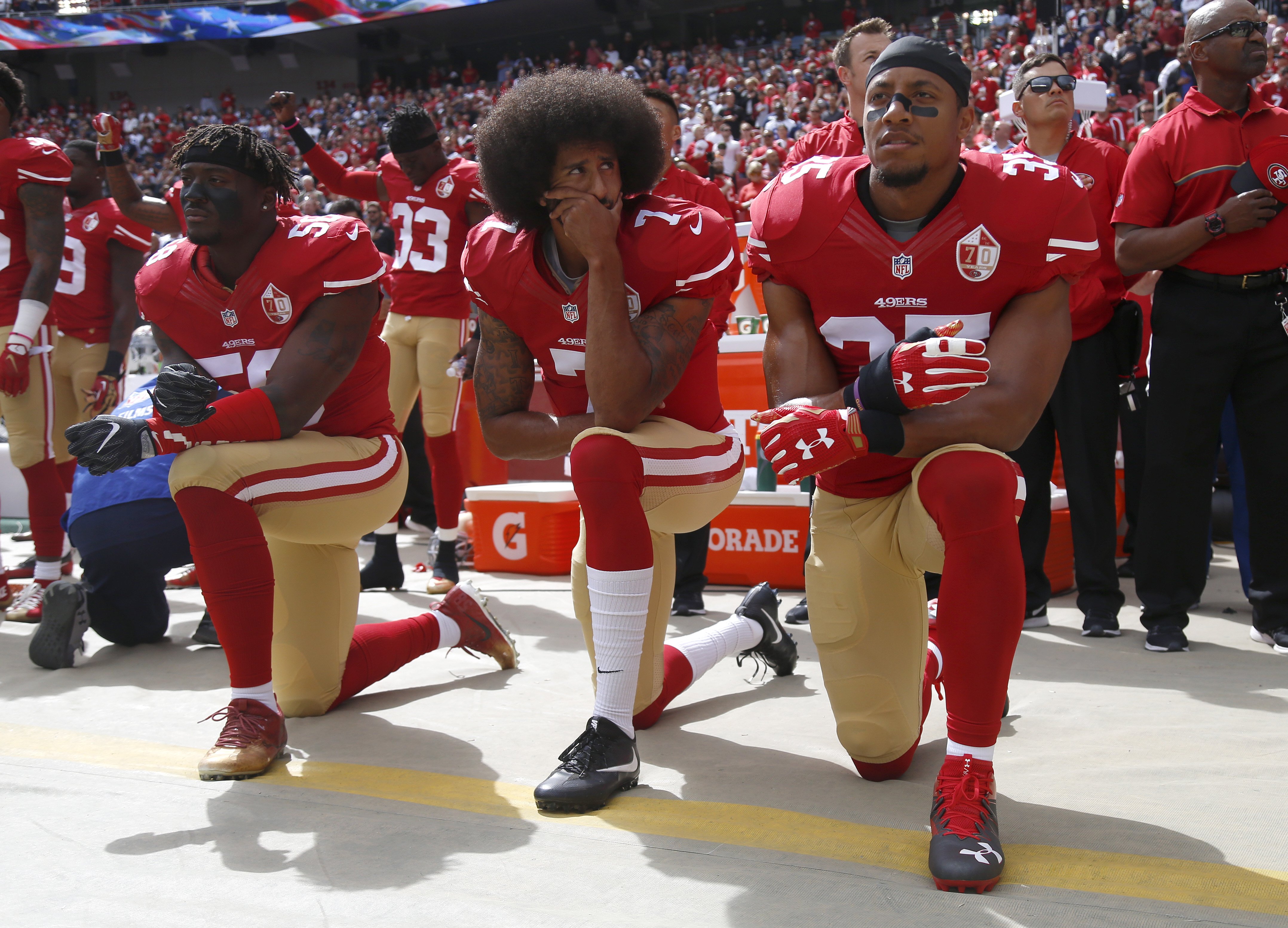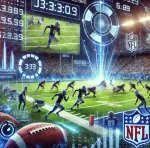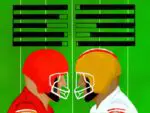There was a time that sports and politics were rigidly linked. Throughout the history of the major American sporting leagues, the greatest champions of the sport have been those who took a political stand. Jackie Robinson is arguably the most important man in sporting history. Robinson was a six-time all-star, was the NL MVP in 1949 and won a World Series in 1955, but Robinson was forever immortalized by simply playing a white-man’s game. Robinson breaking the color barrier in the MLB would send shockwaves not only through baseball, but the entire country. In a country still mired by segregation and bigotry, audiences of all races rooted for a black baseball player.
After Robinson lit the torch, generations of athletes used their platform as a political stage. At the 1968 games American track stars Tommie Smith and John Carlos each reached the podium, when Smith won the 200-meter race and Carlos came in third. The two became icons when they gave a “Black Power Salute” during the American national anthem to protest the treatment of African-Americans in the height of the Civil Rights Movement. Both athletes were expelled from the games and booed from across the stadium, but are still remembered to this day.
The salute may have tarnished the reputation of Smith and Carlos for the rest of their careers, but they weren’t the only ones who put everything on the line for what they believed in. Muhammad Ali, arguably the best boxer in history, put his career and well-being in jeopardy when he refused enlistment after being drafted for the Vietnam War, due to his religious beliefs. Ali was arrested and charged with draft evasion. He was acquitted in 1971 when the Supreme Court overruled his conviction, but the court of public opinion will always be split on Ali.
Forty years later, Arizona Cardinals Pat Tillman put his career and well-being in jeopardy, when he volunteered for the U.S. Army after 9/11. Tillman was killed in action in 2004, and forever cemented his legacy as an American hero.
Today many would argue that athletes should stick to sports—leave the politics to the politicians. The recent political divisiveness and party polarity was only heightened when the most disliked president in American history, Donald Trump, took office. For many athletes, it’s been nearly impossible to keep their mouths shut about what’s going on in this country. Not everyone can be like Tom Brady, who after donning the Trump “Make America Great Again” hat, responded with “What’s going on in the world? I haven’t paid much attention. I’m just a positive person.” Is Brady’s perceived political naivety what sports fans want out of their athletes? While Brady was justifiably criticized for his tone-deaf statements, he hasn’t received nearly the level of ostracization as a fellow quarterback.
Which of course leads us to Colin Kaepernick. The quick quarterback out of Nevada was the rising star of the early 2010’s. After riding the bench in his rookie season for the San Francisco 49ers, Kaepernick’s legend was born in his second season on a Monday Night Football game against the mighty Chicago Bears defense. Kaepernick got his first NFL start, after the usual starter Alex Smith was ruled out with a concussion from the previous game. Kap went on to smash the Bears defense on primetime, leading the Niners to a 32-7 victory, with 246 yards and two touchdowns. The next week, he outdueled Drew Brees and the Saints with a 31-21 victory. By the time Smith was ready to return, Kaepernick had already locked down the starting role.
In the playoffs, the shifty QB continued to impress. He broke the NFL single-game record for rushing yards for a quarterback in the Divisional Round against the Green Bay Packers with a 181 yards rushing. The Niners rode Kaepernick’s legs all the way to Super Bowl XLVII, where they lost a close one to the Baltimore Ravens. Yet, Kaepernick, the man who hardly anyone knew before the season, had come a hair away from winning a Super Bowl in his first season as a starter. The very next season, the Niners were one completed pass away from reaching another Super Bowl. At this point, many had believed that Kap was surely becoming one of the top and most dynamic QB’s in the game, but that’s where his success would run out.
In 2014, after signing a monstrous $126 million contract extension, the Niners success petered out with a mediocre 8-8 season. At the end of the year, the architect behind Kaepernick’s rise, head coach Jim Harbaugh, left the NFL to coach at Michigan.
After Harbaugh’s exit, Kaepernick would never be the same. Injuries and a degradation of mechanics plummeted his stock. As quickly as Kaepernick’s legacy rose, his star had abruptly burnt out.
Two forgettable seasons later, after the league had seemingly forgotten the QB, Kaepernick reemerged with a national protest in association with Black Lives Matter. The protest began in the preseason of the 2016 season. Kaepernick sat during the playing of “The Star-Spangled Banner” and announced post-game that “I am not going to stand up to show pride in a flag for a country that oppresses black people and people of color.” Kaepernick would continue to kneel for the national anthem for the entirety of the season, even after the growing controversy spread. A majority of Americans grew disgusted with the protest. A poll conducted in the middle of the regular season showed that 72 percent of Americans found his protest unpatriotic, 61 percent said that they didn’t support the protest. The protest split the country along racial lines as well, 70 percent of white respondents disagreed with his stance, while 40 percent of minority respondents disagreed.
The season came and went. The Niners had a horrendous season with a 2-14 record, Kaepernick had a largely forgettable yet redeemable season, with 2,241 passing yards and 468 rushing yards in only 12 games. Kaepernick decided to opt out of his deal in 2017 to test the free agency market. The only problem is the quarterback who had lead his team to a Super Bowl only four years previous suddenly had no market.
Now I’ll be the first to admit that Kaepernick is a mirage of his 2012/2013 self; he will never be the star he once was. But with the lack of usable quarterbacks in the NFL, you have to figure he could at least land a role as a backup. Remember, this is a league where Blake Bortles, arguably the clearest bust in recent memory, still retains a starting role in Jacksonville. A league where Jay Cutler can be called out of retirement at age 34 by Miami, when franchise QB Ryan Tannehill tore his ACL and journeyman Josh McCown won the starting by default for New York after the man who was drafted to win the job, Christian Hackenberg, didn’t even know how to properly break a huddle. If these are starters across the NFL, I’m calling bullshit that Kaepernick can’t at least land a backup gig.
This comes down to his protest plain and simple. Although, while many argue that Kaepernick would be too much of a distraction or that fans wouldn’t watch a team with Kaepernick on it, that theory was recently debunked. Despite the unfavorable attention towards Kaepernick’s protest, only three percent of NFL fans watched less games due to his protest, proving that the idea of millions of disgruntled fans deflecting from the NFL was a significant reach.
The owner’s blockade of Colin Kaepernick doesn’t prove that the owners are taking a moral stand; Cowboys owner Jerry Jones didn’t have any problem signing Greg Hardy, a man convicted of domestic violence, or defending Ezekiel Elliott, another player with domestic violence allegations; and Eagles owner Jeffrey Lurie showed no objection to signing Mike Vick, a man who spent twenty-one months in prison following his involvement in dog fighting. This just shows that NFL owners are hypocrites.
If Kaepernick had knelt for the anthem in 2013, this would likely be a different story. If he was still perceived as a star like Richard Sherman, Tom Brady or Le’Veon Bell, I believe NFL owners would be making that phone call to sign him. The simple fact is that once you produce results in the league, you can practically say or do what you want. Sherman has been politically outspoken his entire career and has called out his coach, management and quarterback; he still has a job. Brady’s been involved in two “cheating” scandals, which albeit were blown way out of proportion, and is a perceived Trump supporter; he’s still the NFL’s “Golden Boy.” Le’Veon Bell missed the beginning of the last two seasons due to substance abuse and may miss it again this season after a contract holdout; he still has a job and is likely about to be made the highest running back in NFL history. But a marginal quarterback, who hasn’t committed any crimes or had a NFL suspension has a career that is dwindling by the day.
Of course, the NFL is a business at the end of the day: It’s not about morality—it’s about dollars. Yet in a very combative day and age, the NFL is setting a dangerous precedent. The league, which is already known to be incredibly tone-deaf and insensitive in the past, shouldn’t want a free speech dilemma to continue to blacken the image of their already darkened reputation. Now is not the time to tell athletes to stay in their lanes and out of politics. The country needs a Jackie Robinson or a Muhammad Ali to flock to. Kaepernick is no Jackie Robinson, but refusing to sign him will make just make him a martyr, and make the resemblance to the political champions of the past that much clearer.
The NFL won’t be able to sneak their way out of this one. Thinking that squeezing the air out of Kaepernick’s career will squash the protest is foolish. Whatever you think about Kap, this discussion doesn’t end with him. This season, Kaepernick’s anthem protest is spreading like wildfire. Just in the preseason alone, sixty players have protested or supported a teammate who protested during the anthem, including Marshawn Lynch, Michael Bennett, Kenny Britt and Eric Reid all kneeling and Malcolm Jenkins, Wesley Woodyard and Robert Quinn sporting the “Black Power” raised fist.
No matter what happens with Kaepernick, the genie’s now out of the bottle, and it’ll never go back in.

















